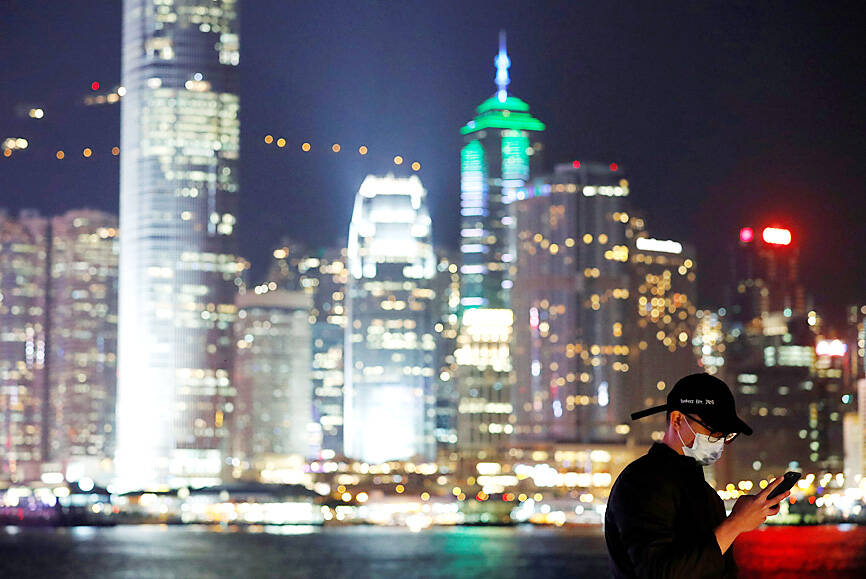Fewer Hong Kongers were granted resident status in Taiwan this year as the government increased scrutiny of applicants using loopholes in the investment immigration scheme to gain residency without making investments.
An increasing number of Hong Kongers emigrated after the introduction of Hong Kong’s National Security Law in 2020, and many chose Taiwan as a destination.
The National Immigration Agency’s (NIA) statistics show that a record 11,173 Hong Kongers received resident status, and 1,685 received permanent resident cards last year.

Photo: Reuters
However, from January to October this year, 7,211 and 1,127 Hong Kongers received resident and permanent resident status respectively, down by 404 and 289 respectively compared with the same period last year, the statistics show.
An agency official on Sunday said on condition of anonymity that NIA officials found during immigration interviews that some applicants were unable to explain their motivation for investing in Taiwan or demonstrate any results from their ventures.
Investigations showed that some import and export documents used in such applications were falsified, their companies had no turnover or no employees were hired, the person said.
It became evident that immigration firms were helping their clients establish several companies registered at one address, with the firms purchasing goods from each other to create transaction records for immigration reviews, the person said.
The transactions were sometimes for family expenditures such as daily goods or Costco orders, which were put on a company’s balance sheet, the source said.
The investment immigration scheme requires foreigners to invest at least NT$6 million (US$197,012) in a company, guarantee its operation for at least three years and hire at least two Taiwanese employees. After one year, the applicant is eligible to apply for permanent residency.
Suspicious investments were put under NIA observation for one year, and residency was rescinded for investments found to be for non-business activity, the person said.
Many immigration firms made guarantees of success to potential applicants to attract their business, the source said.
When clients asked why their applications were denied, these firms would blame vague government review criteria, the official said.
Asked whether the review process for Hong Kongers is especially strict, the official said that the NT$6 million threshold is one of the lowest in the world, and should not be considered strict for those who want to legitimately invest, the official said, adding that the government’s Hong Kong support policy has not changed.
Hong Kongers interested in immigrating through the investment scheme can contact the Taiwan-Hong Kong Service and Exchange Office for advice and instruction, the person said.
The NIA should evaluate such firms to prioritize applications from reputable immigration agents, the official added.

Chinese Nationalist Party (KMT) Chairman Eric Chu (朱立倫), spokeswoman Yang Chih-yu (楊智伃) and Legislator Hsieh Lung-chieh (謝龍介) would be summoned by police for questioning for leading an illegal assembly on Thursday evening last week, Minister of the Interior Liu Shyh-fang (劉世芳) said today. The three KMT officials led an assembly outside the Taipei City Prosecutors’ Office, a restricted area where public assembly is not allowed, protesting the questioning of several KMT staff and searches of KMT headquarters and offices in a recall petition forgery case. Chu, Yang and Hsieh are all suspected of contravening the Assembly and Parade Act (集會遊行法) by holding

PRAISE: Japanese visitor Takashi Kubota said the Taiwanese temple architecture images showcased in the AI Art Gallery were the most impressive displays he saw Taiwan does not have an official pavilion at the World Expo in Osaka, Japan, because of its diplomatic predicament, but the government-backed Tech World pavilion is drawing interest with its unique recreations of works by Taiwanese artists. The pavilion features an artificial intelligence (AI)-based art gallery showcasing works of famous Taiwanese artists from the Japanese colonial period using innovative technologies. Among its main simulated displays are Eastern gouache paintings by Chen Chin (陳進), Lin Yu-shan (林玉山) and Kuo Hsueh-hu (郭雪湖), who were the three young Taiwanese painters selected for the East Asian Painting exhibition in 1927. Gouache is a water-based

Taiwan would welcome the return of Honduras as a diplomatic ally if its next president decides to make such a move, Minister of Foreign Affairs Lin Chia-lung (林佳龍) said yesterday. “Of course, we would welcome Honduras if they want to restore diplomatic ties with Taiwan after their elections,” Lin said at a meeting of the legislature’s Foreign Affairs and National Defense Committee, when asked to comment on statements made by two of the three Honduran presidential candidates during the presidential campaign in the Central American country. Taiwan is paying close attention to the region as a whole in the wake of a

OFF-TARGET: More than 30,000 participants were expected to take part in the Games next month, but only 6,550 foreign and 19,400 Taiwanese athletes have registered Taipei city councilors yesterday blasted the organizers of next month’s World Masters Games over sudden timetable and venue changes, which they said have caused thousands of participants to back out of the international sporting event, among other organizational issues. They also cited visa delays and political interference by China as reasons many foreign athletes are requesting refunds for the event, to be held from May 17 to 30. Jointly organized by the Taipei and New Taipei City governments, the games have been rocked by numerous controversies since preparations began in 2020. Taipei City Councilor Lin Yen-feng (林延鳳) said yesterday that new measures by